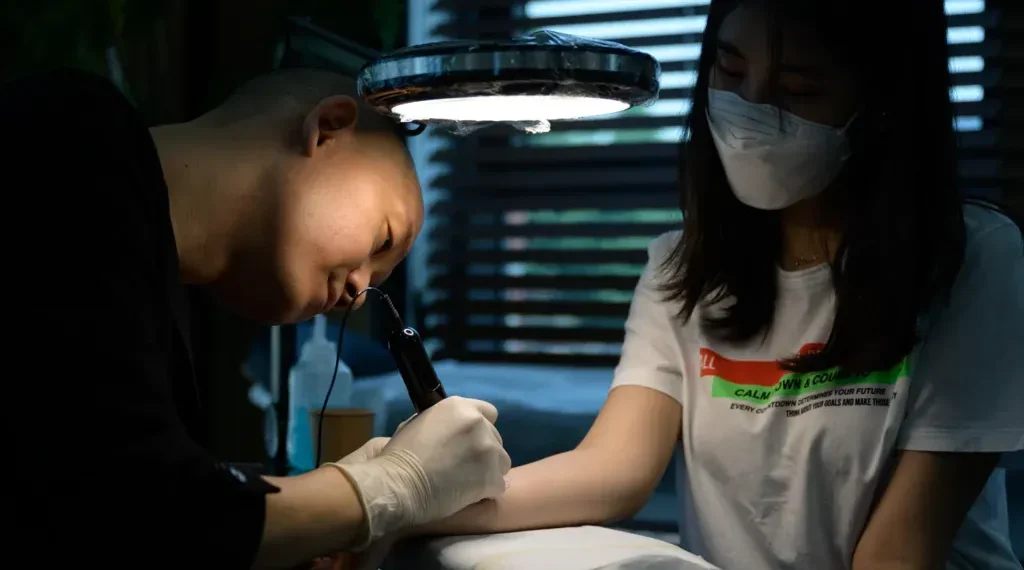South Korea Legalizes Tattooing by Non-Medical Professionals After 30 Years
Published: September-26-2025, 14:30 EDT
South Korea has taken a landmark step by legalizing tattoo artistry by non-medical professionals, ending more than 30 years of restrictions. The move follows persistent campaigns by tattooists who sought the right to practice openly without the threat of prosecution.
With the passage of the Tattooist Act, the profession will now be regulated, requiring practitioners to obtain licenses and follow national safety standards.
A Shift From Decades of Restriction
For decades, tattooing in South Korea was technically limited to medical professionals. This stemmed from a 1992 Supreme Court ruling that classified tattooing as a medical act. Under that interpretation, artists without medical licenses faced severe penalties, including prison terms of up to five years or fines of as much as 50 million Korean won (about $35,000).
Despite these rules, tattooing thrived underground. Artists often worked discreetly, offering everything from traditional body art to semi-permanent makeup. However, they were vulnerable to legal risks, harassment, or even exploitation, as disgruntled clients could threaten to report them.
Voices From the Tattoo Community
Tattoo artists and industry advocates welcomed the legislative breakthrough. Lim Bo-ran, president of the Korea Tattoo Federation, became emotional during the announcement, saying: “I can’t speak because it feels like a dream. I am truly grateful.”
Cases shared by artists reveal the pressures they faced under the old law. A tattooist known as Narr previously told the BBC she endured harassment from a client but avoided reporting it to police out of fear of prosecution. Another artist, Banul, was reported to authorities by a dissatisfied client who demanded compensation.
According to South Korea’s Ministry of Health and Welfare, there were an estimated 350,000 tattoo artists as of 2021, with most specializing in cosmetic tattoos for eyebrows, lips, and hairlines. Few, however, had formal medical training, highlighting the gap between practice and legal recognition.
Growing Acceptance and Shifting Attitudes
Although tattoos remain controversial in South Korea, societal attitudes have been gradually evolving. In recent years, courts began acquitting some tattooists, signaling a softening stance toward the practice.
Park Ju-min, chairman of the National Assembly’s health and welfare committee and a chief sponsor of the Tattooist Act, emphasized that legalization is about safety as well as recognition. “Citizens will now be able to get tattoos safely, and those engaged in the tattoo industry will be recognized as legal professionals,” he said.
He also pointed out that even within the National Assembly, many lawmakers already had semi-permanent cosmetic tattoos such as lip or eyebrow procedures, underlining how widespread the practice has become.
Concerns From the Medical Community
Not all groups welcomed the change. The Korean Medical Association opposed the measure, insisting that tattooing should remain a medical procedure. In a statement, it warned that tattoos could damage skin, complicate cancer diagnosis, and carry health risks if not properly regulated.
The group argued that the rising popularity of tattoos does not diminish the medical concerns involved. Critics in the medical field remain skeptical about whether non-medical practitioners can guarantee safe and hygienic procedures.
Stigma and Cultural Resistance
Despite legalization, stigma toward tattoos persists in South Korean society. While popular among younger generations and prominent in online influencer culture, tattoos are still often associated with negative stereotypes, including links to gang activity in past decades.
Recent opinion polls indicate that a majority of South Koreans continue to view tattoos unfavorably, though younger respondents are more supportive. Experts believe it may take years for social attitudes to fully normalize the practice, even with the law in place.
Implementation and Licensing Requirements
The Tattooist Act will not take effect immediately. Implementation is scheduled for two years from now, allowing time to set up the licensing system.
Under the new framework, tattoo artists must:
-
Pass a national exam.
-
Complete safety and hygiene training.
-
Maintain detailed client and procedure records.
Laser tattoo removals, however, will remain restricted to licensed medical professionals.
This phased approach, lawmakers say, balances the interests of consumer safety with the recognition of a long-marginalized industry.
A Turning Point for an Emerging Industry
The legalization marks a pivotal moment for South Korea’s tattoo sector, which has operated in a legal gray zone for decades. For artists, it represents not just protection from prosecution, but also the ability to practice openly and build legitimate businesses.
While challenges remain—including cultural stigma and concerns over safety—the recognition of tattoo artistry as a licensed profession positions South Korea to align more closely with international standards where body art is widely accepted.
As the new law takes effect, both supporters and critics will be watching closely to see how regulation reshapes the industry and influences public perception.
This article was rewritten by JournosNews.com based on verified reporting from trusted sources. The content has been independently reviewed, fact-checked, and edited for accuracy, neutrality, tone, and global readability in accordance with Google News and AdSense standards.
All opinions, quotes, or statements from contributors, experts, or sourced organizations do not necessarily reflect the views of JournosNews.com. JournosNews.com maintains full editorial independence from any external funders, sponsors, or organizations.
Stay informed with JournosNews.com — your trusted source for verified global reporting and in-depth analysis. Follow us on Google News, BlueSky, and X for real-time updates.














